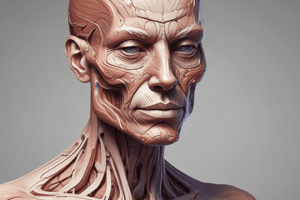Podcast
Questions and Answers
What is the main function of the epidermis on the palms of the hands and the soles of the feet?
What is the main function of the epidermis on the palms of the hands and the soles of the feet?
- To provide pigmentation
- To house blood vessels and nerves
- To secrete oil and sweat
- To protect underlying tissues by being extremely thick (correct)
Which of the following structures is NOT considered an appendage of the skin?
Which of the following structures is NOT considered an appendage of the skin?
- Hair follicles
- Nails
- Arteries (correct)
- Sebaceous glands
Which type of tissue connects the dermis of the skin to the underlying deep fascia?
Which type of tissue connects the dermis of the skin to the underlying deep fascia?
- Muscle tissue
- Superficial fascia (correct)
- Nerve tissue
- Squamous epithelium
Flashcards are hidden until you start studying
Study Notes
Skin Structure
- The skin consists of two main parts: the epidermis (superficial) and dermis (deep).
- The epidermis is a stratified epithelium that is extremely thick on the palms and soles to withstand wear and tear.
- The dermis is composed of dense connective tissue containing blood vessels, lymphatic vessels, and nerves.
Skin Layers
- The skin is made up of the following layers:
- Squamous epithelium
- Sweat pores
- Melanocytes
- Epidermis
- Dermis
- Sweat glands
- Subcutaneous tissue (fat)
- Connective tissue
- Muscle
Skin Appendages
- The skin's appendages include:
- Nails
- Hair follicles
- Sebaceous glands
- Sweat glands
Hair Follicle Structures
- The hair shaft is part of the skin's structure.
- Each hair follicle has an associated:
- Oil (sebaceous) gland
- Erector muscle of hair
Blood and Nerve Supply
- Arteries supply blood to the skin.
- Veins facilitate blood return from the skin.
- Nerves innervate the skin.
Fasciae
- There are two types of fasciae: superficial and deep.
- The superficial fascia (subcutaneous tissue) connects the dermis to the underlying deep fascia.
- The deep fascia is a membranous layer of connective tissue that invests deeper structures.
Studying That Suits You
Use AI to generate personalized quizzes and flashcards to suit your learning preferences.




